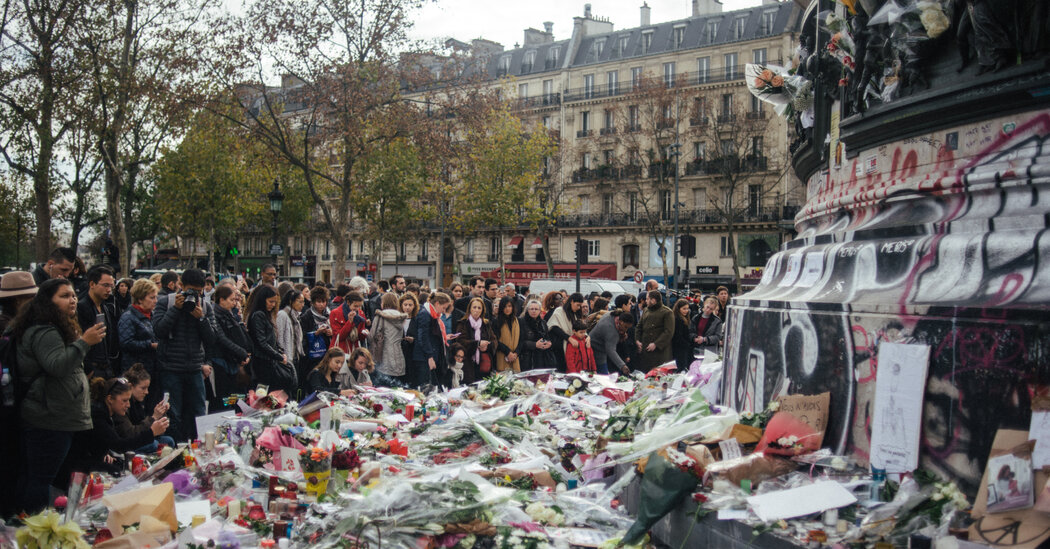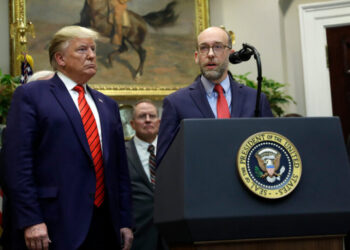
For Djamel Cheboub, memories of the terrorist attacks in and around Paris on Nov. 13, 2015, are painfully vivid.
He was at La Belle Équipe, a cafe in the 11th Arrondissement, when men with assault rifles sprayed the terrace with gunfire, killing a friend who was with him. Mr. Cheboub was hospitalized for a year and a half. His right foot was blown away by a bullet and replaced with a prosthesis. His left arm was shattered, and he had to undergo major reconstructive surgery.
But even as many survivors and families of the victims remember the attacks with agonizing clarity, the country’s collective memory has grown fuzzier.
A series of surveys conducted since 2015 have revealed a sharp decline in the number of people who know the three sites where the attacks occurred: an area outside the national soccer stadium, the Bataclan concert hall, and cafes and restaurants in central Paris. Last year, 31 percent could not identify them, compared with just 3 percent in 2016, when the first survey was conducted.
“After 10 years, people don’t talk about it so much,” Mr. Cheboub said. He is not bitter, but his own mind won’t let him forget. “The memories often come back,” he said. “That will never change.”
France is making a significant effort to commemorate the 10th anniversary of the attacks, which killed more than 130 people and injured more than 500. The coordinated shootings and suicide bombings by Islamic State extremists were the worst assaults in France’s post-World War II history and inflicted lasting damage on the nation.
Two survivors who later died by suicide have been recognized as official victims.
In recent weeks, there has been a flurry of books, shows, documentaries, exhibits and events tied to the assault. Paris is dotted with plain blue posters bearing the city’s motto — Latin for “She is rocked by the waves but does not sink” — which became an ode to resistance after Nov. 13.
On Thursday, a commemorative garden of crisscrossing paths and blocks of granite that symbolize the targeted locations will be officially inaugurated in central Paris. A museum to memorialize a number of terror attacks in France is expected to open in the coming years.
Gradually, though, a disconnect has grown between those who experienced the horror of the attacks firsthand, and a majority of French people for whom Nov. 13 has become like a chapter in a history book. Important, but distant.
Denis Peschanski, a historian who is coleading a 12-year, multidisciplinary research program to study how the attacks were remembered, spoke of a “dual phenomenon”: a decade later, people remember Nov. 13 more than any other terrorist attack in France, though their memories of key details has waned.
Mr. Peschanski said that memories of Nov. 13 have persisted far more than those of other terrorist incidents in France, like the January 2015 attacks in Paris, or the 2016 Bastille Day massacre in Nice. It remains the Islamic State’s deadliest and most elaborate plot in Europe, and the 10-month trial, when 20 men were convicted in 2022, received intense media coverage.
One survey last year found that more than 80 percent still remembered where they were when the Nov. 13 attacks happened. And the fact that they were perpetrated by children of immigrants who grew up in France and Belgium has fueled anti-immigrant sentiment. The attacks also exposed intelligence failures and led to sweeping antiterrorism laws that critics have called overreaching.
Yet the details have slipped from many people’s minds. For some, the Bataclan — where 90 people were killed — has become shorthand for the attacks as a whole, which pains victims from other sites, Mr. Peschanski noted.
“The brain is always efficient, whether for individuals, groups or society as a whole,” he said. “We remember what is sufficient to explain an event.”
For some victims, the feeling that their experience is becoming a historical footnote was initially difficult to process.
“I did struggle in the beginning with people not remembering,” said Mandy Palmucci, an American who was at La Belle Équipe with some friends by chance because their table at a nearby restaurant was not ready.
Ms. Palmucci was not struck in the attack but nearly everyone around her was shot or killed. She has returned to Paris every year for commemorations, and said that she only feels stronger after years of therapy. “I’m a lot more forgiving when people forget about it, or forget that there were restaurants hit,” she said. Still, she added, “there’s a hierarchy in that night of what people experienced and of memory when it comes to the terrorist attacks.”
For others, it is expected — necessary, perhaps — that society should move on.
“There comes a point where you have to let go of the thing that obsesses you,” said Arthur Dénouveaux, the president of Life for Paris, a victim support association that will officially disband on Thursday after the 10th-anniversary commemorations.
Like many, Mr. Dénouveaux was shaken by the death by suicide last year of Fred Dewilde, a Bataclan survivor who had explored his pain through graphic novels.
“I hadn’t considered before Fred’s suicide whether it is possible to heal from trauma if society itself is still traumatized,” he said, an ever-present question in a country where soldiers patrolling the streets are a reminder that the terror threat is still high.
One of the main studies in the Nov. 13 memory research program, which was inspired partly by similar work in the United States after Sept. 11, 2001, has been collecting and analyzing thousands of hours of testimony from more than 900 people, including survivors, families of victims, residents of the targeted areas, other Parisians and inhabitants of other French cities, who are questioned every few years.
Another study, using a smaller sample size of 200 volunteers, aims to better understand the brains of those suffering from post-traumatic stress, why some victims developed such disorders but others did not and how intrusive memories can be mitigated.
“Ten years ago, in France, we knew very little about post-traumatic stress syndrome,” said Francis Eustache, a neuropsychologist who led the research program with Mr. Peschanski.
For Mr. Cheboub, the survivor of the attack on La Belle Équipe, healing has come only gradually.
After the attacks, local authorities in Paris helped him move into a handicapped-equipped apartment; a few years later, he and his partner had a baby girl; and after several trips to Iceland, Mr. Cheboub, a former clothing designer, started a business there renting glass-roofed cottages to look at the northern lights.
“It’s like a therapy when you see the immensity of nature, you feel smaller and you can rationalize it all,” he said. “I thought by doing this project, it could also be healing for others.”
But Mr. Cheboub has not told his 7-year-old daughter what happened to him. For many survivors, sharing their memories of the attacks with loved ones is the hardest experience of all.
“I don’t want her to grow up thinking ‘Papa was there, and that could happen to me too,’” Mr. Cheboub said. “I will wait to tell her when she is old enough to understand.”
Aurelien Breeden is a reporter for The Times in Paris, covering news from France.
The post How France Remembers the November 2015 Terrorist Attacks in Paris appeared first on New York Times.



